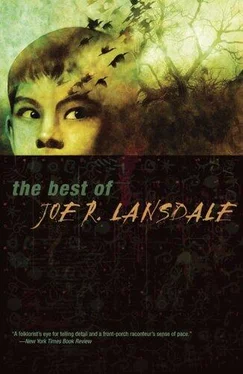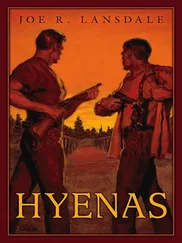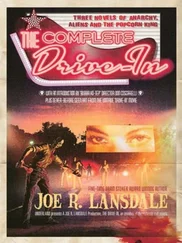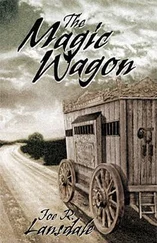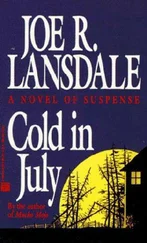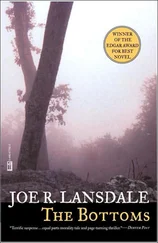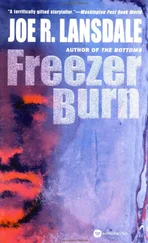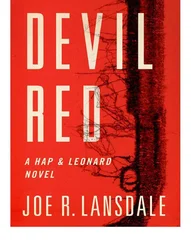At first I thought Mr. Smoote was just having him a big run of customers, but as we got up there, we saw there was a wad of people coming from the barn. The wad was Mr. Nation, his two boys, and some other man I’d seen around town before but didn’t know. They had Mose between them. He wasn’t exactly walking with them. He was being half dragged, and I heard Mr. Nation’s loud voice say something about “damn nigger,” then Daddy was out of the car and pushing through the crowd.
A heavyset woman in a print dress and square-looking shoes, her hair wadded on top of her head and pinned there, yelled, “To hell with you, Jacob, for hidin’ this nigger out. After what he done.”
It was then I realized we was in the middle of the crowd, and they were closing around us, except for a gap that opened so Mr. Nation and his bunch could drag Mose into the circle.
Mose looked ancient, withered and knotted like old cowhide soaked in brine. His head was bleeding, his eyes were swollen, his lips were split. He had already taken quite a beating.
When Mose saw Daddy, his green eyes lit up. “Mr. Jacob, don’t let them do nothin’. I didn’t do nothin’ to nobody.”
“It’s all right, Mose,” he said. Then he glared at Mr. Nation. “Nation, this ain’t your business.”
“It’s all our business,” Mr. Nation said. “When our womenfolk can’t walk around without worrying about some nigger draggin’ ‘em off, then it’s our business.”
There was a voice of agreement from the crowd.
“I only picked him up ‘cause he might know something could lead to the killer,” Daddy said. “I was comin’ out here to let him go. I realized he don’t know a thing.”
“Bill here says he had that woman’s purse,” Nation said.
Daddy turned to look at Mr. Smoote, who didn’t acknowledge Daddy’s look. He just said softly under his breath, “I didn’t tell ‘em he was here, Jacob. They knew. I just told ‘em why you had him here. I tried to get them to listen, but they wouldn’t.”
Daddy just stared at Mr. Smoote for a long moment. Then he turned to Nation, said, “Let him go.”
“In the old days, we took care of bad niggers prompt like,” Mr. Nation said. “And we figured out somethin’ real quick. A nigger hurt a white man or woman, you hung him, he didn’t hurt anyone again. You got to take care of a nigger problem quick, or ever’ nigger around here will be thinkin’ he can rape and murder white women at will.”
Daddy spoke calmly. “He deserves a fair trial. We’re not here to punish anyone.”
“Hell we ain’t,” someone said.
The crowd grew tighter around us. I turned to look for Mr. Smoote, but he was gone from sight.
Mr. Nation said, “You ain’t so high and mighty now, are you, Jacob? You and your nigger-lovin’ ways aren’t gonna cut the mustard around here.”
“Hand him over,” Daddy said. “I’ll take him. See he gets a fair trial.”
“You said you were gonna turn him loose,” Nation said.
“I thought about it. Yes.”
“He ain’t gonna be turned loose, except at the end of the rope.”
“You’re not gonna hang this man,” Daddy said.
“That’s funny,” Nation said. “I thought that’s exactly what we were gonna do.”
“This ain’t the wild west,” Daddy said.
“No,” Nation said. “This here is a riverbank with trees, and we got us a rope and a bad nigger.”
One of Mr. Nation’s boys had slipped off while Daddy and Mr. Nation were talking, and when he reappeared, he had a rope tied in a noose. He slipped it over Mose’s head.
Daddy stepped forward then, grabbed the rope and jerked it off of Mose. The crowd let out a sound like an animal in pain, then they were all over Daddy, punching and kicking. I tried to fight them, but they hit me too, and the next thing I knew I was on the ground and legs were kicking at us and then I heard Mose scream for my daddy, and when I looked up they had the rope around his neck and were dragging him along the ground.
One man grabbed the end of the rope and threw it over a thick oak limb, and in unison the crowd grabbed the rope and began to pull, hoisting Mose up. Mose grabbed at the rope with his hands and his feet kicked.
Daddy pushed himself up, staggered forward, grabbed Mose’s legs and ducked his head under Mose and lifted him. But Mr. Nation blindsided Daddy with a kick to the ribs, and Daddy went down and Mose dropped with a snapping sound, started to kick and spit foam. Daddy tried to get up, but men and women began to kick and beat him. I got up and ran for him. Someone clipped me in the back of the neck, and when I come to everyone was gone except me and Daddy, still unconscious, and Mose hung above us, his tongue long and black and thick as a sock stuffed with paper. His green eyes bulged out of his head like little green persimmons.
On hands and knees I threw up until I didn’t think I had any more in me. Hands grabbed my sides, and I was figuring on more of a beating, but then I heard Mr. Smoote say, “Easy, boy. Easy.”
He tried to help me up, but I couldn’t stand. He left me sitting on the ground and went over and looked at Daddy. He turned him over and pulled an eyelid back.
I said, “Is he…?”
“No. He’s all right. He just took some good shots.”
Daddy stirred. Mr. Smoote sat him up. Daddy lifted his eyes to Mose. He said, “For Christ’s sake, Bill, cut him down from there.”
Mose was buried on our place, between the barn and the field. Daddy made him a wooden cross and carved MOSE on it, and swore when he got money he’d get him a stone.
After that, Daddy wasn’t quite the same. He wanted to quit being a constable, but the little money the job brought in was needed, so he stayed at it, swearing anything like this came up again he was gonna quit.
Fall passed into winter, and there were no more murders. Those who had helped lynch Mose warmed themselves by their self-righteousness. A bad nigger had been laid low. No more women would die — especially white women.
Many of those there that day had been Daddy’s customers, and we didn’t see them anymore at the shop. As for the rest, Cecil cut most of the hair, and Daddy was doing so little of it, he finally gave Cecil a key and a bigger slice of the money and only came around now and then. He turned his attention to working around the farm, fishing, and hunting.
When spring came, Daddy went to planting, just like always, but he didn’t talk about the crops much, and I didn’t hear him and Mama talking much, but sometimes late at night, through the wall, I could hear him cry. There’s no way to explain how bad it hurts to hear your father cry.
They got a new schoolmaster come that spring, but it was decided school wouldn’t pick up until the fall, after all the crops had been laid by. Cecil started teaching me how to cut hair, and I even got so I could handle a little trade at the shop, mostly kids my age that liked the idea of me doing it. I brought the money home to Mama, and when I gave it to her, she nearly always cried.
For the first time in my life, the Depression seemed like the Depression to me. Tom and I still hunted and fished together, but there was starting to be more of a gulf between our ages. I was about to turn fourteen and I felt as old as Mose had been.
That next spring came and went and was pleasant enough, but the summer set in with a vengeance, hot as hell’s griddle, and the river receded some and the fish didn’t seem to want to bite, and the squirrels and rabbits were wormy that time of year, so there wasn’t much use in that. Most of the crops burned up, and if that wasn’t bad enough, mid July, there was a bad case of the hydrophobia broke out. Forest animals, domesticated dogs and cats were the victims. It was pretty awful. Got so people shot stray dogs on sight. We kept Toby close to the house, and in the cool, as it was believed by many that an animal could catch rabies not only by being bitten by a diseased animal but by air when it was hot.
Читать дальше
